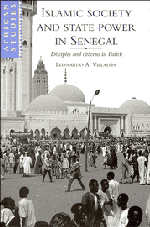Book contents
- Frontmatter
- Contents
- List of tables
- Acknowledgments
- A note on spelling
- Glossary
- Map of Senegal
- Introduction: good Africans, good citizens, good Muslims
- 1 Islam in the politics of state–society relations
- 2 The structure of society: Fatick in the Senegalese context
- 3 The state–citizen relationship: struggle over bridges
- 4 The marabout–disciple relationship I: foundations of recruiting and following
- 5 The marabout–disciple relationship II: the structures of allegiance
- 6 The state–marabout relationship: collaboration, conflict, and alternatives
- 7 Bureaucrats, marabouts, and citizen–disciples: how precarious a balance?
- Notes
- Select bibliography
- Index
- Titles in the series
3 - The state–citizen relationship: struggle over bridges
Published online by Cambridge University Press: 10 November 2009
- Frontmatter
- Contents
- List of tables
- Acknowledgments
- A note on spelling
- Glossary
- Map of Senegal
- Introduction: good Africans, good citizens, good Muslims
- 1 Islam in the politics of state–society relations
- 2 The structure of society: Fatick in the Senegalese context
- 3 The state–citizen relationship: struggle over bridges
- 4 The marabout–disciple relationship I: foundations of recruiting and following
- 5 The marabout–disciple relationship II: the structures of allegiance
- 6 The state–marabout relationship: collaboration, conflict, and alternatives
- 7 Bureaucrats, marabouts, and citizen–disciples: how precarious a balance?
- Notes
- Select bibliography
- Index
- Titles in the series
Summary
Introduction: a story
On January 27, 1989, the Senegalese Minister of Youth and Sports came to visit Fatick. In recognition of the honor, and in order to greet him properly, the important men of Fatick went out early in the morning to the Kaolack road to meet the motorcade. All of the most important administrators were there – the governor of the region, the préfet of the department, the municipal administrator – along with dozens of minor bureaucrats and functionaries from Fatick and other towns in the region and such elected figures as the local deputy to the Senegalese parliament and the town's mayor. In addition, the representatives of innumerable organizations from throughout the region, as well as various local notables – including the Tijan marabout who represents the Sy family in Fatick and the pastor of the Catholic church – joined the reception line on the side of the road. On his arrival the minister stopped to shake hands with all of those present, before everybody climbed back into their vehicles and headed into town. At the turnoff to Fatick a group of young joggers, most of whom wore matching outfits, fell into place alongside the minister's car and escorted him into town.
After a tour of the soccer field, the local offices of the ministry, and several other sites relevant to the occasion, the entire convoy ended up at the Gouvernance and filed into the meeting hall of that building.
- Type
- Chapter
- Information
- Islamic Society and State Power in SenegalDisciples and Citizens in Fatick, pp. 76 - 114Publisher: Cambridge University PressPrint publication year: 1995

